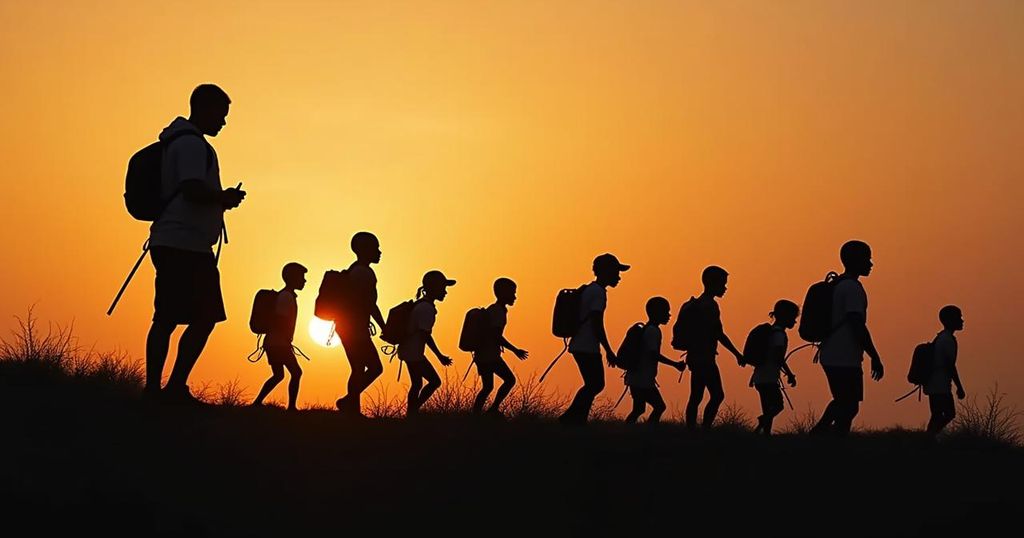The Dominican Republic is set to expel up to 10,000 Haitian migrants per week in response to rising violence in Haiti. This action occurs despite UN warnings against forced deportations due to worsening humanitarian conditions. Rights organizations criticize the expulsion as racially motivated, amid a growing crisis in Haiti marked by gang violence and displacement.
The Dominican Republic has announced a plan to begin expelling up to 10,000 Haitian migrants per week, which will be implemented immediately. This decision arises amidst increasing gang violence, hunger, and instability in Haiti, prompting the United Nations to caution against the forced return of migrants. Dominican presidential spokesman, Homero Figueroa, stated that the operation aims to address the excessive number of migrants in Dominican communities. The United Nations has reported that over 3,661 individuals were killed in Haiti due to gang violence in just the first half of 2024, and more than 700,000 Haitians are currently internally displaced as the humanitarian crisis worsens. The Dominican government justifies the expulsions by citing the international community’s slow response in stabilizing Haiti. President Luis Abinader has previously expressed that “either it and all the countries that had committed themselves [to helping Haiti] act responsibly in Haiti, or we will.” In 2023, the Dominican Republic expelled 250,000 undocumented Haitians, with the recent announcement significantly increasing the projected number of deportations. Rights organizations have condemned these expulsions, labeling them as racially discriminatory and igniting concerns regarding the historical context of anti-Haitian sentiment within the Dominican Republic. Critics have voiced that the government is engaging in racial profiling, targeting individuals based solely on their appearance. Amid ongoing violence in Haiti, the UN refugee agency has reiterated the necessity for countries to refrain from deporting Haitians, asserting their lives and freedoms are threatened by rampant violence and severe human rights violations. The backdrop of this situation reveals the complexities surrounding Haitian migration, which escalated notably following the US occupation of Haiti in 1915. While many Haitians have established lives in the Dominican Republic, persistent fear and prejudice regarding their impact on Dominican society are evident. This discord continues to influence contemporary policies, thereby contributing to a longstanding cycle of discrimination against Haitians living in the Dominican Republic. The current political and social climate in Haiti only exacerbates the plight of migrants, further complicating the intersection between migration policy and humanitarian obligations.
The issues concerning Haitian migrants in the Dominican Republic stem from a historical context of migration and the ongoing crisis in Haiti, characterized by rampant gang violence, severe hunger, and political instability. The United Nations has described the situation in Haiti as dire, with an alarming number of casualties resulting from gang-related activities and a significant population facing displacement and food insecurity. The political landscape in Haiti has deteriorated, prompting not only local concerns but also reactions from neighboring countries, notably the Dominican Republic, which has a history of mixed relations with Haitian migrants. The Dominican government’s recent decisions, which are criticism-laden, reflect deep-rooted prejudices and a perceived need to manage migration as a national security measure, against the backdrop of international humanitarian norms and pressures.
The Dominican Republic’s decision to expel thousands of Haitian migrants amidst escalating violence and humanitarian crises in Haiti raises significant ethical concerns. The expulsion plan, justified by the Dominican government as a measure to control migration, starkly contrasts the UN’s recommendations against deportation during such crises. The situation spotlights historical discrimination against Haitians and raises questions about the Dominican Republic’s treatment of migrants. Without addressing underlying issues in Haiti or fostering a more humane approach to migration, the cycle of conflict and displacement is likely to persist.
Original Source: www.aljazeera.com







